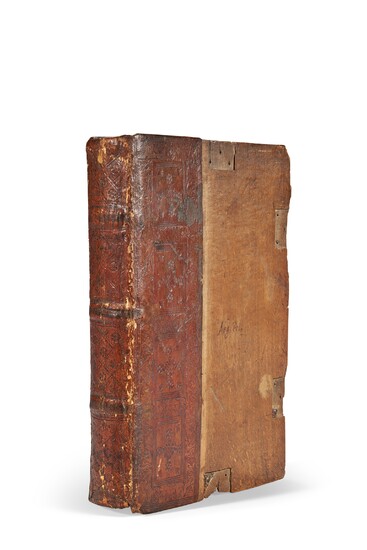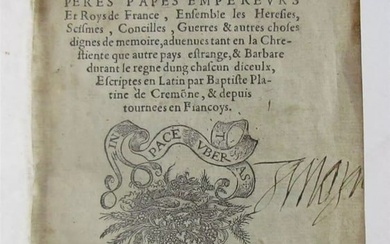Platina's Vitae pontificum
Platina's Vitae pontificum
Johannes de Colonia and Johannes Manthen, 1479
PLATINA, Bartholomaeus (1421-1481). Vitae pontificum. [Venice:] Johannes de Colonia and Johannes Manthen, 11 June 1479.
First edition of Platina’s Lives of the Popes, from the library of Willibald Pirckheimer with his bookplate by Albrecht Dürer. Platina was an Italian humanist and gastronomist. After studying in Florence, he obtained a position in the papal chancery under the noted humanist Pope Pius II. Dismissed from this position by the anti-humanist Pope Paul II, he eventually found his fortunes restored when the strongly pro-humanist Pope Sixtus IV appointed him to the position of Vatican librarian. His Lives of the Popes, written at Sixtus IV's request, was the first work to systematically present the history of the papacy from the time of St. Peter through the reign of Paul II, while also giving space to Roman history and themes of Antiquity. Platina is also known as the author of De honesta voluntate et valetudine, the first printed cookbook, which went through many editions. The present book was owned by Willibald Pirckheimer, the German Renaissance lawyer and Renaissance humanist. A member of a prominent Nuremberg family, he went to Italy to study law in Padua and Pavia. He was a close friend of Albrecht Dürer, and it is thought that many of the classical references in Dürer’s work were derived from conversations with Pirckheimer, who also financed the artist’s second trip to Italy. In response Dürer created portraits of Pirckheimer and bookplates for his library. HC 13045*; BMC V 235; IGI 7857; BSB-Ink P-565; Bod-Inc P-342; Goff P-768; ISTC ip00768000.
Super-chancery folio (307 x 205mm). 248 leaves. Initials in blue and red with red flourishing, paragraph marks in red and blue (slight discoloration to first and last pages, worm track in blank lower margin n1-o4, a few wormholes in blank lower margins of last quires, leaves o3-6 detached from binding, leaves ff2-6 partially detached). Contemporary Italian brown quarter morocco over wooden boards, deckle edges often visible at foot and fore-edge of leaves, inscription “Ang. Pol.” on front board (lacking clasps, endpapers renewed). Provenance: marginal notes throughout in several contemporary humanistic hands – Willibald Pirckheimer (1470-1530, his woodcut bookplate by Albrecht Dürer laid down on front pastedown, Dürer’s engraved portrait of Pirckheimer laid down on back pastedown, some marginalia and manuscript index; by descent and eventually sold to:) – Royal Society (armorial bookplate and inkstamps indicating sale) – acquired from William H. Schab, New York, 9 May 1955.
View it on
Sale price
Estimate
Time
Auction House
Platina's Vitae pontificum
Johannes de Colonia and Johannes Manthen, 1479
PLATINA, Bartholomaeus (1421-1481). Vitae pontificum. [Venice:] Johannes de Colonia and Johannes Manthen, 11 June 1479.
First edition of Platina’s Lives of the Popes, from the library of Willibald Pirckheimer with his bookplate by Albrecht Dürer. Platina was an Italian humanist and gastronomist. After studying in Florence, he obtained a position in the papal chancery under the noted humanist Pope Pius II. Dismissed from this position by the anti-humanist Pope Paul II, he eventually found his fortunes restored when the strongly pro-humanist Pope Sixtus IV appointed him to the position of Vatican librarian. His Lives of the Popes, written at Sixtus IV's request, was the first work to systematically present the history of the papacy from the time of St. Peter through the reign of Paul II, while also giving space to Roman history and themes of Antiquity. Platina is also known as the author of De honesta voluntate et valetudine, the first printed cookbook, which went through many editions. The present book was owned by Willibald Pirckheimer, the German Renaissance lawyer and Renaissance humanist. A member of a prominent Nuremberg family, he went to Italy to study law in Padua and Pavia. He was a close friend of Albrecht Dürer, and it is thought that many of the classical references in Dürer’s work were derived from conversations with Pirckheimer, who also financed the artist’s second trip to Italy. In response Dürer created portraits of Pirckheimer and bookplates for his library. HC 13045*; BMC V 235; IGI 7857; BSB-Ink P-565; Bod-Inc P-342; Goff P-768; ISTC ip00768000.
Super-chancery folio (307 x 205mm). 248 leaves. Initials in blue and red with red flourishing, paragraph marks in red and blue (slight discoloration to first and last pages, worm track in blank lower margin n1-o4, a few wormholes in blank lower margins of last quires, leaves o3-6 detached from binding, leaves ff2-6 partially detached). Contemporary Italian brown quarter morocco over wooden boards, deckle edges often visible at foot and fore-edge of leaves, inscription “Ang. Pol.” on front board (lacking clasps, endpapers renewed). Provenance: marginal notes throughout in several contemporary humanistic hands – Willibald Pirckheimer (1470-1530, his woodcut bookplate by Albrecht Dürer laid down on front pastedown, Dürer’s engraved portrait of Pirckheimer laid down on back pastedown, some marginalia and manuscript index; by descent and eventually sold to:) – Royal Society (armorial bookplate and inkstamps indicating sale) – acquired from William H. Schab, New York, 9 May 1955.




